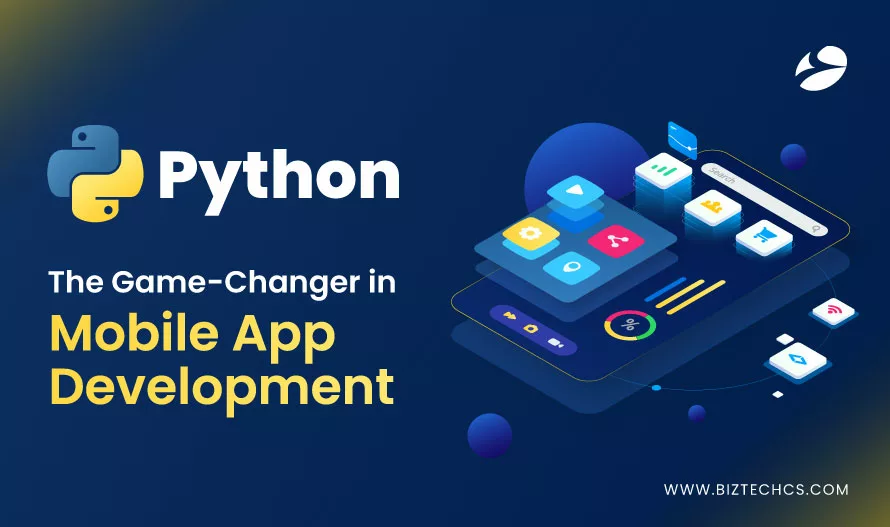2091
Python: The Game-Changer in Mobile App Development
01 Mar, 2024
7 min read
2091
01 Mar, 2024
7 min read
Table of Content

Released in the early 1990s, Python is an object-oriented, general-purpose programming language. Its intuitive and easy-to-learn syntax makes it a popular choice among developers. Furthermore, its efficiency, reliability, and extensive set of libraries and frameworks make it apt for web and software development.
However, when we are talking about mobile app development, Python might not be the first language that comes to mind. More so because it doesn’t natively support mobile app development. It lets you use external frameworks or tools like Django, Kivy, Plyer, etc. for Python app development.
With popular app development technologies such as Swift, Javascript, and Kotlin in existence, how does Python shine in this regard? That’s what this blog is all about!
Did you know Python surpassed Java and C to become the most popular programming language in 2022, up from its 4th position in 2021?
The versatile nature of Python alongside its rich library facilitates in seamless development of mobile applications. You can develop a myriad of applications with Python. Here are some types for your reference!
From simple puzzle games to complex interactive gaming apps, Python can be used for developing both. The Pygame library can be used for developing such gaming applications and the straightforward syntax helps with game logic development.
Develop apps that process audio and video content without a hassle! Leverage libraries such as PyDub and OpenCV to build video editing applications, multimedia content management tools, audio processing tools, video streaming apps, and so on. Shopify and Netflix are some of the top apps built using Python.
We don’t have to explain for you to understand what social networking apps are! We spend at least an hour or two every day on social media apps like Instagram, Facebook, WhatsApp, Snapchat, and Pinterest.
Such applications are content-driven and facilitate network communication, user interactions, content sharing, and messaging. Popular social media apps like Facebook, Instagram, and Pinterest also use Python alongside other programming languages for their functioning.
Build AI-powered applications with features like natural language processing, image recognition, and predictive analysis with Python. Use Python’s extensive libraries to develop intuitive mobile apps with AI capabilities.
Python is a popular choice for blockchain development due to its simplicity and security. Libraries like web3.py allow developers to create decentralized applications (dApps), smart contracts, and cryptocurrencies, contributing to the growing ecosystem of blockchain technology.
Besides these, Python mobile app development can help build several other kinds of apps. From IoT applications and finance applications to business and computational apps, you can develop a range of apps in Python.
When you consult and hire Python developers, you can get your idea across and get a unique app developed for your specific needs.
Since mobile app development in Python doesn’t come natively, you have to use various tools and frameworks for it. Let’s look at some of the most promising Python frameworks of 2024!
1. Django
Django is an open-source app development Python framework. It follows MVT (Model, View, Template) architecture for development. The framework’s clean and pragmatic design helps with the rapid development of complex, database-driven applications. It eases development with its rich set of tools and features.
Benefits of Django:
Limitations of Django:
Types of Mobile Apps You Can Build With Django: Social networking apps, eCommerce applications, utility apps, educational apps
2.Kivy
The open-source Kivy framework is good for developing multitouch applications. It supports both mobile and desktop platforms and is highly interactive. Like Beehive, you can also participate in Python iOS app development, and Android development with Kivy.
It is built on top of the OpenGL graphics engine for GPU acceleration and fast rendering. You can also customize the application with a wide selection of widgets.
Benefits of Kivy:
Limitations of Kivy:
Types of Mobile Apps You Can Build With Kivy: Gaming applications, Educational apps, Utility apps, Productivity apps
3.BeeWare
Beeware’s open-source suite of libraries helps use Python for app development. With Beeware, you can write code once and deploy it everywhere (Android, iOS, Windows, Mac, Linux), facilitating cross-platform app development. You can develop native user interfaces that match the developed platform’s look and feel.
Benefits of BeeWare:
Limitations of BeeWare:
Types of Mobile Apps You Can Build With BeeWare: Utility apps, educational apps, business apps, data analysis apps
4.Web2py
The open-source, full-stack framework follows the MVC architecture. It promotes code reusability and simplifies the management of app components. It facilitates the rapid development and deployment of secure and scalable web applications.
Benefits of Web2py:
Limitations of Web2py:
Types of Mobile Apps You Can Build With Web2py: Social networking apps, utility and productivity apps, eCommerce apps, data-driven apps
5.Pygame
The open-source Python library Pygame is designed for making video games. From basic to complex gaming applications, you can use the Pygame modules like sound, input handling, and graphics for successful development. It is built on top of a cross-platform SDL library.
Benefits of Pygame:
Limitations of Pygame:
Types of Mobile Apps You Can Build With Pygame: Utility apps, educational apps, 2D Arcade games
As evident, Python for mobile app development presents a plethora of suitable options with the help of frameworks and tools. While Python is becoming more and more sophisticated for the development of mobile apps, how does it compare to other technologies in terms of cost?
Let’s begin with the various factors that influence the cost of Python app development!
Take a look into this table to get a brief idea about Python developer rates!
| Location | Developer Rates |
| India | $20-$30 /hour |
| UK | $50-$100 /hour |
| USA | $100-$150 /hour |
| Canada | $100-$150 /hour |
| UAE | $30-$60 /hour |
Python has proven itself to be a highly suitable and versatile language for app development across a wide range of applications. Its readability, simplicity, and extensive libraries and frameworks, such as Django, Flask, and Kivy, facilitate rapid development and encourage best practices in coding and design.
While Python might face challenges in areas requiring high performance or where native app development is preferred, solutions like PyPy for performance optimization and frameworks like BeeWare and Kivy for creating mobile applications demonstrate Python’s adaptability.
Considering its strengths and the evolving landscape of technology, Python remains not only suitable but also a compelling choice for app development.
If you are considering Python for app development, why not connect with skilled developers and seek consultation regarding the same. Connect with a leading Python app development company like BiztechCS and get expert help with the same.

.NET
20
By Devik Gondaliya
15 Jul, 2025

.NET
25
By Devik Gondaliya
15 Jul, 2025

Odoo
60
By Biztech
15 Jul, 2025